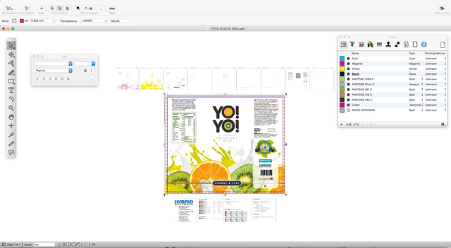Marsh Labels, a family-owned digital label printer in Brighton, is branching out since transitioning its prepress department to the PACKZ PDF Editor.
Marsh Labels
Marsh Label started out in 1983 when Gary’s father Barrie Burnley set up the company with Ron Marsh. It employs around 22 staff with a prepress team of five.
“We run two HP Indigo, 6900 & 6800 plus four ABG Digicon’s and a new peel and reveal machine” says Gary Burnley, joint managing director who first joined the company 26 years ago and then took over the running with his sister, Alison Murphy, when their father retired.
“We take in lots of short runs and provide the repro to put the files together. In the past a 500 – 1,000 label run has taken longer to repro than to print. PACKZ has improved turnaround time significantly so that we have more capacity to take in more work. It’s giving us the confidence to branch out into another line of work.”
Marsh takes on about 20,000 new label jobs each year, providing digital capacity for other print shops around the UK, printing labels for most sectors of industry including beverage, pharmaceuticals, retail, cosmetic, healthcare, food, beverage, security and industrial.
PACKZ
“PACKZ is head and shoulders over any other software I’ve used and I’ve been in the business for more than 20 years”, says Leigh Howe, prepress manager. “It has a great feel to it and HYBRID Software is constantly driving it forward. They listen to people like us who’ve got a few ideas and the next thing you know, you see an update with that feature in it.”
“The transition to PACKZ only took us about a week. It was like getting used to the feel of a new car. Second nature after only a few days.”
PACKZ captures all elements of a job in a single PDF file. It contains all the features required for labels and packaging production such as trapping, full transparency support, colour separation mapping, Live Objects for variable content, barcode pre-flight and creation, tabular step & repeat, and structured assets including fonts, images, separations, object-based screening settings, barcodes, and other PDF objects.
“It’s native PDF so the job stays in PDF through prepress so there are no conversions that can slow things down and clutter up the file server.”
Variable Data in PACKZ
The number of variable data (VDP) jobs has doubled over the past year says Howe. It’s mostly barcodes and numbering but because the VDP module is inside PACKZ the prepress department can work on a customer supplied PDF file from start to finish, cutting out unnecessary steps such as importing the file into another application and then exporting the file again.
“It’s very efficient. And I’m much more confident that what I see on the proof is correct than I ever was before because PACKZ reduces the risk of human error: dimensions of crop boxes are computer generated rather than drawn manually; editing and sharing the colour books is simple and no longer a manual process; there’s bar code recognition that is computer generated from the incoming file. All these features take seconds off each part of the checking process. Multiply that up and already the number of jobs we process per day has gone up and the only thing we’ve changed is to move to PACKZ.”
Visit the Marsh Labels website here.

